If you’re self-employed, 2020 was probably not your year to spend cooped up at home with sourdough and sweatpants. (Maybe it wasn’t your year at all.) The world changed, and you had to change with it. For small businesses all over America, the reality is that there was no screeching halt in 2020, but rather a pivot; the necessity of a paycheck forced people everywhere to think quickly, take risks, and swing big. Meet Thimble’s Class of 2020, a profile of small businesses owners who, despite it all, pushed their chips to the middle of the table and opened for business for the first time! So we wanted to find out why. And as we started asking our tens of thousands of customers, we discovered that a lot of people went all in—in fact, about 40% of Thimble’s customers last year started their businesses in 2020. With survey data and interviews with real small business owners, we’re exploring the unexpected catalysts for new business, real lessons for operating in a totally unpredictable market, and the power of betting on yourself.
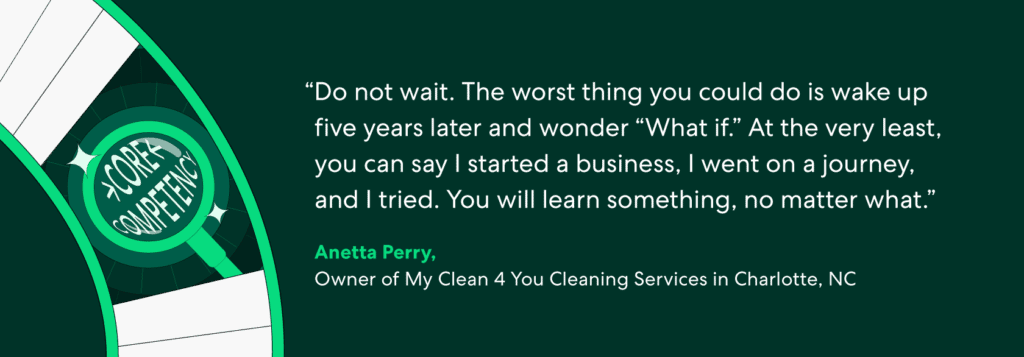
Why now?
With seemingly insurmountable odds in our economy, any profile on new business formation begs the question of timing—why now? At the onset of the COVID-19 pandemic, unemployment numbers in the United States reached brutal highs, peaking at 14.8% nationally in April 2020. That’s the highest percentage since our government started collecting data in 1948, and by some adjusted figures, experts suggest that the total number of Americans unemployed or out of work surpassed that of The Great Depression. As they say, the going got tough. Really tough. But of our survey respondents who started their business in 2020, all of them said that it was their first business, and all of them said that they planned to work for themselves indefinitely. It’s a bold claim, but the data speaks to a real culture shift around this inflection point in our society. It’s safe to assume that many people feel that they can’t rely on their old sense of job security anymore, so they’re taking matters into their own hands. While many respondents said they had always wanted to own their own business, 2020 may have been just the push they needed to finally get going.
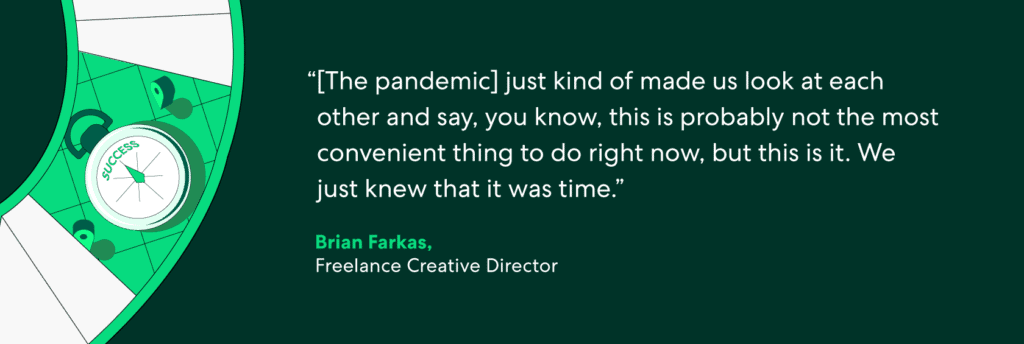
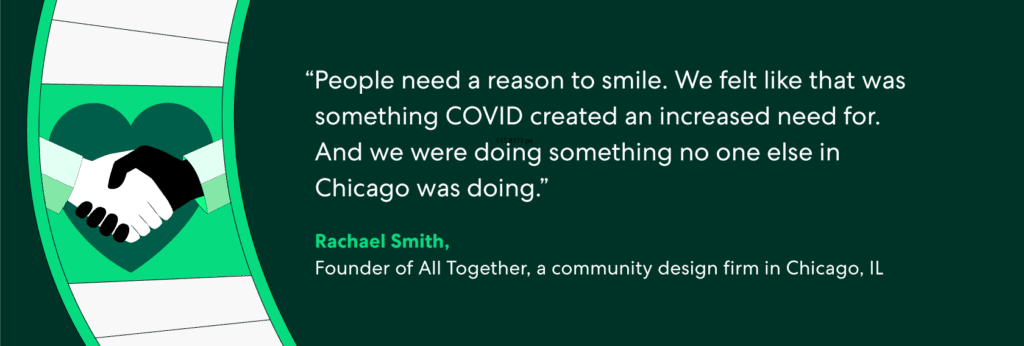
And Rachel and Brian were not alone. In 2020, freelancers represented nearly 36% of the global workforce, meaning that over a third of all working people are no longer seeking “traditional” employment. This shift reflects a desire for independence among the average working person, an attitude that’s been stoked by the sense of helplessness many people have felt. People are really looking inward, with some asking themselves for the first time, “What do I want to make of my life? What skills do I have? What need can I fill in the world?” And those questions point to the idea that starting and growing a business is ultimately about survival: doing what you can with what you have.

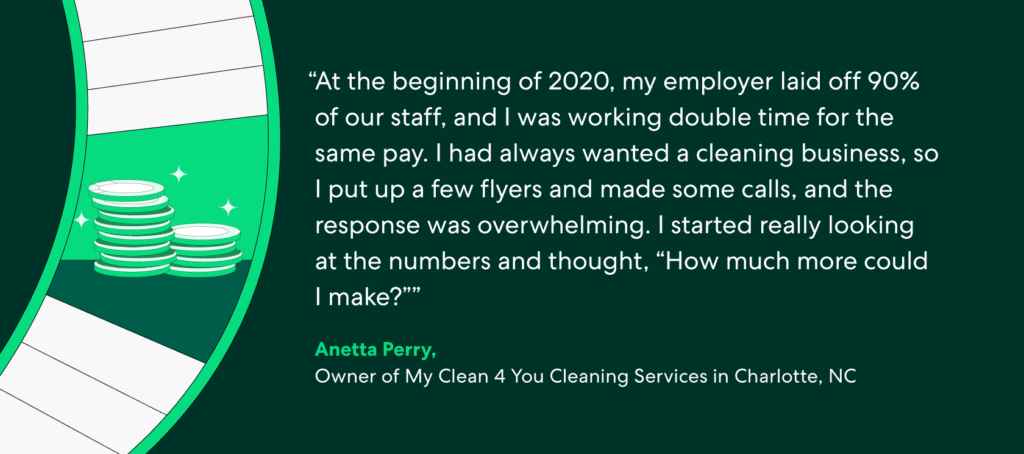
What do small businesses believe about 2021?
Sure, starting a business and fulfilling your destiny sounds romantic (and it can be!), but starting is the easy part. It’s the daily persistence to get up and keep going that is the true test of your motivation. And interestingly, our survey showed a marked difference in overall confidence between businesses that started within the last year and more experienced entrepreneurs. We asked small business owners to rate how confident they felt about the success of their business going into 2021, and on a scale of 1-10, businesses started in 2020 gave a median score of 8.6. In comparison, confidence among businesses started before 2020 landed at a 7.8 average, which tells us that, even in 2020, newer business owners are more optimistic about their prospects in the year ahead than those who had started prior. This could be attributed to a wide range of factors; if you started a business in what seems like the worst of times, things can really only go up! And conversely, if you’ve been in the fight for a while, the events of last year likely dealt more of a blow to the stability you had built for yourself, from where you got your funding to the suppliers of your raw materials. But experience and attitude aside, many small business owners said the same concerns affected their confidence in the future. Of their concerns, the biggest across categories seemed to be in continuing to find customers, as so many industries are upended by continued economic shutdowns. Different industries also mentioned unique challenges in the year ahead:
- Cleaners said building a foundation to fund their own salaries and pay employees was a top concern.
- Handymen, contractors, and landscapers also said they were most preoccupied with meeting payroll. They also mentioned the difficulty in turning a profit when low supply for raw materials means they’re forced to sell work at cost.
- Consultants and freelancers, such as photographers and graphic designers, said they’re most worried about the marketing budgets of other companies, because they depend on the success of other businesses.
- E-commerce vendors and craftspeople said a lack of supply for certain products and the shipping infrastructure could cause delays in their deliveries.
- Events and entertainment vendors suggested that COVID-19 will restrict the budgets of event hosts and local governments who typically contract them.
- Pet sitters called out a concern around their category getting crowded by less experienced people, because the barrier to entry for pet services is relatively low.
We know that the impacts of 2020 are far from gone—on Wall Street, Main Street, and in the world as a whole—but it’s clear that business owners are holding fast to one belief:
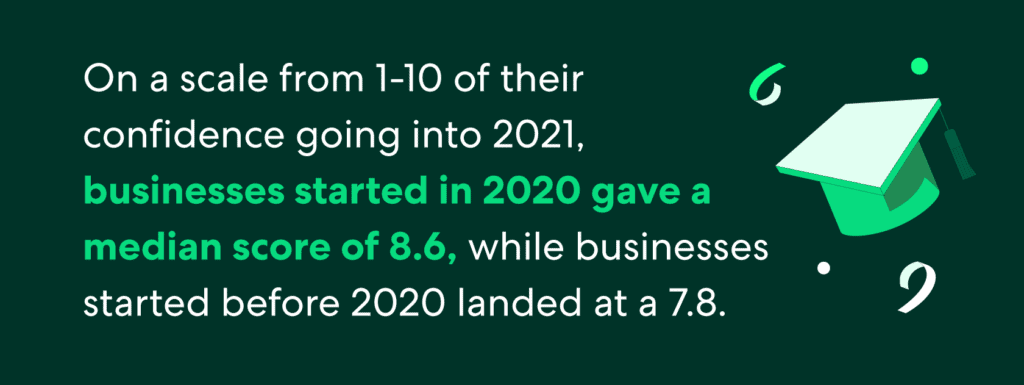
you’ve got to keep pushing.
So why are new businesses so optimistic?
When faced with a challenge, we always have the choice to view it as defeat—or an opportunity. Last year, small businesses found totally new ways of doing things: figuring out contactless delivery, spurring the e-commerce revolution, and even building makeshift outdoor dining villages. And all those changes signal a major silver lining for the small business economy in the years ahead: innovation.
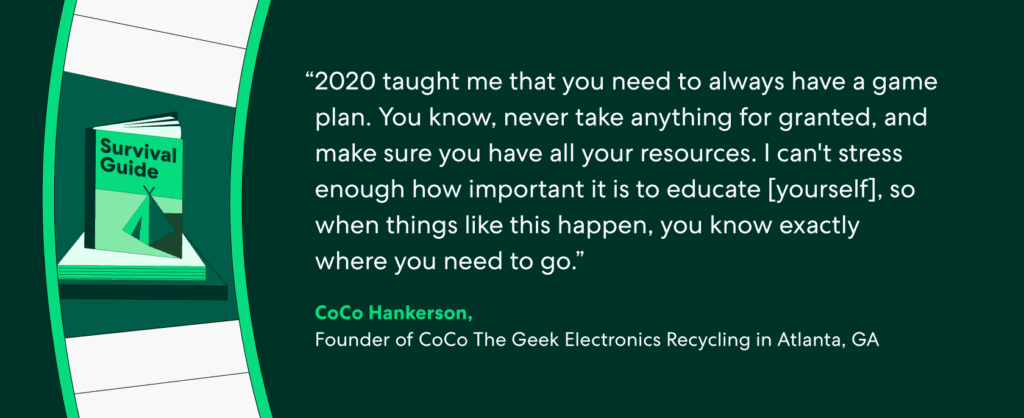
The methods may be different, but the underlying lessons for sustaining a new business remain the same. In our research, we took away some valuable lessons for 2020 businesses from seasoned professionals who have made it through hardships in the past.
What does it really take to survive?
It’s a big question, but predictably, one piece of advice for weathering the storm that came up from our longtime business owners again and again was to save money and operate conservatively. Assets and liabilities. Profits and losses. Supply and demand. Your entire business can (and should) be put in these terms, so you can maximize your strengths and account for your weaknesses. And this may seem heady, but no matter the size of your business or what you do, this is the kind of thinking required to really protect yourself when life happens. Consider this advice with some real world examples:
- Identify your “core competency” – What do you do better than anyone else in your market? Focus on perfecting your best service or most sought-after product, sometimes referred to in fancy business terms as your core competency. For example, if you’re a cleaner, just doing a good job has another business term: “table stakes.” You’ve got to provide professional service, beyond what your customers could do on their own. And if you started in residential cleaning, don’t think about expanding to other services until you’re confident in your core capabilities.
- Double down – Pay yourself first, then reinvest any other earnings into the thing you do best until you’re untouchable. If you’re a landscaper, can you buy specialized equipment that your competitors don’t own? If you’re a tutor, can you get online certifications that boost your credibility? These are the types of questions you should constantly ask yourself to stay ahead of the curve.
- Build indestructible customer relationships – Real, lasting relationships. They go beyond a hard day’s work—it’s about fully entrenching your services in the lives of the people you serve. Take their feedback, respond to their Yelp reviews, and (literally) send them a Christmas card. How do you move closer to the guarantee of a paycheck? By making sure nobody can lay mulch like you, make lemon bars like yours, or pour candles that last as long. If you’re constantly attune to how you can exceed the expectations of your customers, you’re less likely to lose work when budgets get tight.
- Save for a rainy day – Your business finances and personal finances aren’t really all that different—before you can dream big, you should do everything in your power to create stability. A 2018 Chamber of Commerce study found that nearly 33% of all small businesses in the U.S. don’t have a contingency fund, which means that one slowdown in revenue could put them out of business. Start small; experts recommend saving three to six months of operating costs in an account that you don’t dip into for any other reason. Bob Mulholland, a veteran photographer and Thimble customer, added this: “This is the same advice I’ve given for the last 30 years: If you have a full time job, do not just quit it and start your business. You have to be making at least, if not more, than you were making in your other business and do it on a regular basis before you make that transition.”
- Get insured – Beyond your basic general liability insurance and any other insurances for your day-to-day work, many respondents to our survey recommended further protections like business interruption insurance, which is specifically designed to keep you afloat if a disaster, such as a fire or hurricane, prevents you from generating income. Note: many standard business interruption policies specifically exclude human infectious disease from coverage, but because of the events of 2020, some insurers are creating “pandemic business interruption” products that fill the gap. The takeaway: get insured, and when you do, always read the fine print.
- And lastly, stay motivated! In business, attitude really is everything (but a strong cup of coffee doesn’t hurt either).
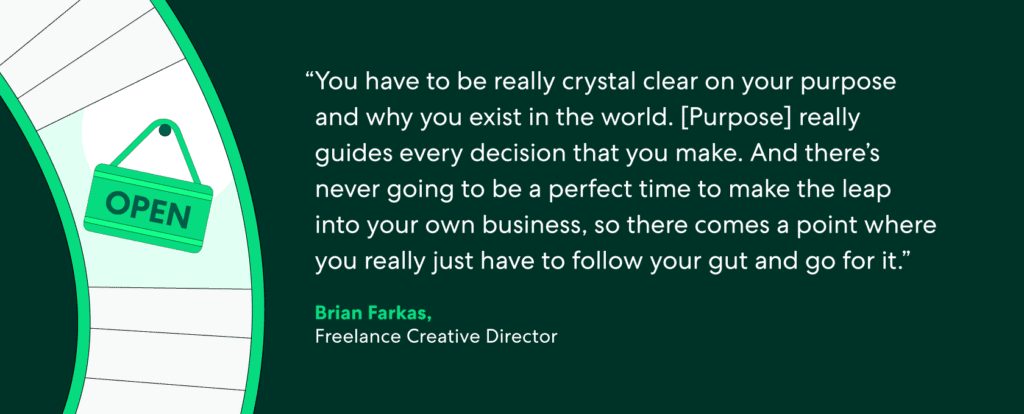
Can we predict the future?
Hahaha. No. 2020 proved Murphy’s Law: anything that can happen will happen, but Thimble’s Class of 2020 proved that you can find success with one simple principle: do what you can with what you have. We’ve covered the attitudes of seasoned business owners, the optimism we all share for the future, and the concrete steps you can take to keep your business on track. Thimble believes no business is too small and no idea is too bold, and the Class of 2020 reflects the pinnacle of our values. So here’s to getting started! We’d shake your hands, if that was cool anymore. See you next year—same time, same place, but with a lot of new businesses forming in 2021. Let’s go.








